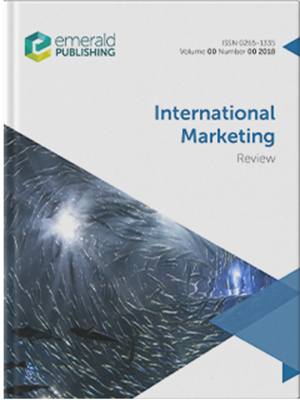Managing disruptive external forces in international marketing
IF 4.6
3区 管理学
Q1 BUSINESS
引用次数: 4
Abstract
PurposeDisruptive external forces can bring businesses to a standstill and make their strategic plans obsolete overnight. COVID-19 exemplifies such a disruptive force, which has caused worldwide havoc and ongoing disruption in many sectors of the economy, while concurrently providing great opportunities for others. The goal in this study is to examine the experiences of firms that have been impacted by a prior disruptive force, offer five theoretical lenses for framing and examining such events, and provide a set of axioms based on the research findings.Design/methodology/approachThe authors used a qualitative approach involving five short international marketing case studies of firms based in South Korea and Taiwan. These nations and firms were selected on the bases of their overall judicious navigation of the conditions presented by the COVID-19 pandemic. The authors gathered information about these firms through primary sources of information (personal and remote interviews as well as other communications), which the authors augmented with information from secondary sources.FindingsThe results indicate that external forces can bring both opportunities and threats to firms' international marketing strategies. The authors found that two strategies help firms cope with managerial issues associated with both the demand and the supply sides in successful firms in these nations: (1) leveraging opportunities presented by the pandemic through the successive introductions of new product and (2) the expansion of both the domestic and international markets.Research implicationsThe research provides five theoretical lenses to articulate the impact of disruptive external forces on international marketing strategies.Practical implicationsThe research offers thirteen demand and supply side axioms for marketing managers involved in international business (e.g. exporters, importers, MNCs) to cope with disruptive external forces, like COVID-19.Social implicationsDisruptive external forces, such as the pandemic, have enormous impact on firms and consumers alike. This research aims to limit the negative impact of future disruptions by engaging in contingency planning and added resilience, through which firms may continue to function and, to a large extent, consumers are able to acquire the necessary goods and services to maintain their quality of life.Originality/valueThe authors attribute the quicker response of these firms to their agility in managing the market impacts related to COVID-19 and to their prior conditioning in their respective geopolitical spheres. The authors summarize the findings in a set of nine supply side and a set of four demand side axioms.管理国际营销中的破坏性外部力量
目的破坏性的外部力量可能会使企业陷入停滞,并使其战略计划在一夜之间过时。新冠肺炎就是这种破坏性力量的例证,它在世界范围内对许多经济部门造成了严重破坏和持续的破坏,同时也为其他部门提供了巨大的机会。本研究的目标是检验受先前破坏力影响的企业的经历,为构建和检验此类事件提供五个理论视角,并根据研究结果提供一套公理。设计/方法论/方法作者采用了一种定性方法,包括对韩国和台湾企业的五个简短国际营销案例研究。这些国家和公司是根据其对新冠肺炎大流行带来的条件的总体审慎导航而选择的。作者通过主要信息来源(个人和远程采访以及其他交流)收集了有关这些公司的信息,作者通过第二来源的信息对这些信息进行了补充。研究结果表明,外部力量对企业的国际营销策略既有机会也有威胁。作者发现,有两种策略有助于企业应对这些国家成功企业的需求和供应方面的管理问题:(1)通过不断推出新产品来利用疫情带来的机遇;(2)扩大国内和国际市场。研究含义该研究提供了五个理论视角来阐明破坏性外力对国际营销战略的影响。实际含义该研究为参与国际业务的营销经理(如出口商、进口商、跨国公司)提供了13条需求和供应方面的公理,以应对破坏性外部力量,如COVID-19。社会含义破坏性外部势力,如疫情,对企业和消费者都有巨大影响。这项研究旨在通过参与应急计划和增加弹性来限制未来中断的负面影响,通过应急计划和弹性,企业可以继续运作,在很大程度上,消费者能够获得必要的商品和服务,以保持他们的生活质量。原创/价值作者将这些公司的快速反应归因于它们在管理与新冠肺炎相关的市场影响方面的灵活性,以及它们在各自地缘政治领域的先前条件。作者在一组由九个供应方公理和一组由四个需求方公理组成的公理中总结了研究结果。
本文章由计算机程序翻译,如有差异,请以英文原文为准。
求助全文
约1分钟内获得全文
求助全文
来源期刊

International Marketing Review
BUSINESS-
CiteScore
8.70
自引率
12.00%
发文量
55
期刊介绍:
International Marketing Review (IMR) is a journal that has, as its core remit, the goal of publishing research that pushes back the boundaries of international marketing knowledge. IMR does this by publishing novel research ideas, and by publishing papers that add substance to, question the basic assumptions of, reframe, or otherwise shape what we think we know within in the international marketing field. IMR is pluralistic, publishing papers that are conceptual, quantitative-empirical, or qualitative-empirical. At IMR, we aim to be a journal that recognizes great papers and great research ideas, and works hard with authors to nurture those ideas through to publication. We aim to be a journal that is proactive in developing the research agenda in international marketing, by identifying critical research issues, and promoting research within those areas. Finally, IMR is a journal that is comfortable exploring, and that fosters the exploration of, the interfaces and overlaps between international marketing and other business disciplines. Where no interfaces or overlaps exist, IMR will be a journal that is ready to create them. IMR’s definition of international marketing is purposefully broad and includes, although is not restricted to: -International market entry decisions and relationships; -Export marketing and supply chain issues; -International retailing; -International channel management; -Consumer ethnocentrism, country and product image and origin effects; -Cultural considerations in international marketing; -International marketing strategy; -Aspects of international marketing management such as international branding, advertising and new product development.
 求助内容:
求助内容: 应助结果提醒方式:
应助结果提醒方式:


